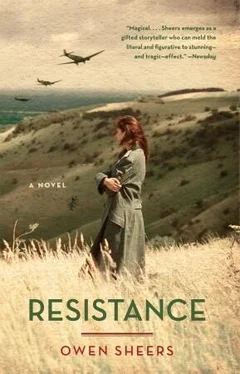The men have been gone for two weeks now and all the women agree the best dreams are the nightmares. The worst are the good ones, the ones that give them what they want, the ones that make them forget. They have all been surprised how cruel the mind can be in this way. How willing the imagination is to put them through the mill again and again. For Sarah it’s when she dreams of sleeping beside Tom, knowing that his warm weight is just inches away from her. When she dreams of waking and going downstairs to light the fire to heat the water for his wash; of hearing his tread on the floorboards above her, him coming down and appearing at the bottom of the stairs pulling on his waistcoat, doing up the buttons with his thick thumbs. Him telling her what his plans for the day are, or asking her how much butter they have left, or maybe just sitting at the table and taking his tea from her with a creased smile. When she dreams of all this and then wakes, to the creaking house, to the dull static of the river, to the empty bed beside her, it is like losing him all over again as her stomach swings away from her and she has to let all she remembers to be true come flooding back.
So far this truth has been a silent one. None of them has heard anything from or about their husbands. Mary and Bethan rode over into Llanthony a few days afterwards and found nothing changed. The farmers were still there, working their land. Everyone was worried, of course, and the Ministry hadn’t been to collect the potatoes, but otherwise nothing had changed. The valley, they said, had felt as busy as ever, its through road to Hay-on-Wye lending it a subtle flow of life unlike their own dead end, which invited no travellers, no passers through. They’d said nothing of the missing men to anyone. Menna suggested they should tell the police or even the Home Guard, but Maggie had quashed that idea. Sarah was surprised when Mary had agreed with her, as if this was something the two older women both knew was right, simply because of their age. And so they’d all waited instead. For a word, a message, or for the men just to come back, as suddenly as they’d left.
Maggie’s wireless was of little help. Every now and then it picked up transmissions, giving them a piecemeal idea of what was happening elsewhere in the country. The fighting continued. There had been calls for peace, for surrender from politicians the Home Service called “traitors.” Civilian men along the south coast had been deported. No one knew to where. There was one report of a massacre at a village in Cornwall. “A reprisal,” the announcer had called it. A whole village shot. The women and children. Maggie had flicked the switch and cut off the report midspeech. Since then every time they’d tried to tune in to the news they’d got nothing but the whine and snow of white noise, the crackle of disconnection.
Through it all, they worked. In some ways with the men gone there were fewer jobs to do each day. Fewer meals to be cooked, clothes to wash, plates to clean. But there were new jobs to take the place of these. Harder, heavier, unfamiliar tasks. They decided to break the flock at The Court and divide it between their farms. The new sheep weren’t hefted to their grazing areas and often drifted back towards The Court’s land. Over the past fortnight Sarah had been out three times driving her portion of the broken flock back to Upper Blaen. As well as keeping the flock and the chickens and the pig, Sarah also set about the other jobs Tom usually left for this time of year, the round of mendings and preparations that filled the last weeks of October as the days steadily grew colder towards winter. So she began trimming the hedges around the lower fields, anxious to finish them before the first frost while there was still sap in the wood. She checked and fixed the hurdles, cleaned out the pens, patched the thatch on the hay ricks, laid down poison for the rats, and fixed the broken slates on the little barn beside the house, musty with piles of potatoes and sheaves of straw glowing in the dark. There was also work to be done on the farms of the others. All-day jobs like the pulling of Hywel’s mangels or the winter ploughing of William’s meadows down by the river. In line with Ministry guidelines, William had decided to give over his best alluvial land to oats. Maggie was determined this should still be done, that they should carry on as usual, so at the end of that first week Mary and Sarah found themselves sitting in her kitchen once more, booted and scarved, ready for work.
None of them had ever driven the tractor and Maggie thought the fuel should be saved anyway, so they resorted to the horse-drawn plough, the two big-hoofed cart horses from The Court, their heads nodding like pistons, lifting their knees high out of the cloying soil, drawing Jack’s single plough. The first furrows of the day were a mess. Maggie insisted on driving the plough, leaving Mary to follow with the presser drawn by her own elderly horse. “Don’t you think I’ve watched them do it all my life?” Maggie said when Mary questioned why she should drive the plough. “Every year we’re down at Pandy for the match. Four times William’s won, that he has. An’ him a valley farmer too. Four times mind,” she added, as if William’s skill with the ploughshare would somehow reflect upon her.
Sarah helped Mary with the presser, and from that position, following the plough, soon saw that, however accomplished a ploughman William might have been, his wife had learnt little in all her years of observation. Maggie couldn’t hold the blade deep enough and it often skidded over the field’s stubble or only nicked at its surface. When she did manage to engage the share, the earth turned away clumsily, breaking into clumps rather than folding over like a wave from the prow of a ship as Sarah had seen it do the few times Tom ploughed or when she’d also gone down to the ploughing match herself.
After five uneven, crooked furrows and four awkward, mud-churning turns, Maggie finally gave over to Mary. She joined Sarah on the presser, breathing heavily, a dew of sweat on her forehead despite the bitter day. Together they drove the machine behind Mary’s steady, straight furrows, the clods bowing away neatly, glinting in the weak morning sun.
Mary was a slight woman compared to Maggie, and yet she was able to handle the balance of the heavy plough, to ride its bucking and swinging, bringing the blade in deep and true on each turn. They were not the furrows of a regular ploughman, but they were sufficient.
“Only child,” she called over her shoulder at them. “My father had me ploughing soon as I was big enough to reach both handles.” Sarah couldn’t see Mary’s face, but she could hear the smile in her voice.
That had been last week. Now, at the end of the second since the men’s departure, Sarah and the others were exhausted. There were less bad good dreams, simply because they often fell into bed and slept too deeply for even their own unconsciousness to reach them. And it wasn’t even winter yet, although the season could be sensed every morning in the steelier taste of the air, in the first falling of the leaves, and in their clouded breaths as they walked out into the fields. The lambing ewes and yearlings would have to be brought down soon. The yearlings for protection and the ewes for flushing, for two weeks of good grazing on the richer meadow grass. So Sarah had her own challenges to consider ahead of her. The ones she hadn’t yet thought about, fearing to jinx Tom’s return. But now, increasingly, the work to be done tomorrow, next week, next month even, occupied her mind. At least it distracted her from where the men were, although that was a thought that never left her completely. It ran on beneath all the farmwork like a stream going underground, under all her other thoughts every day. For Sarah it took the form of a growing sense of disbelief. She simply couldn’t give herself to the scenario Maggie had painted. Who’s to say “The Countryman’s Diary” was connected to why the men had gone? Who’s to say it wasn’t just William who’d owned a copy, or if he hadn’t just picked it up from a friend in town?
Читать дальше












